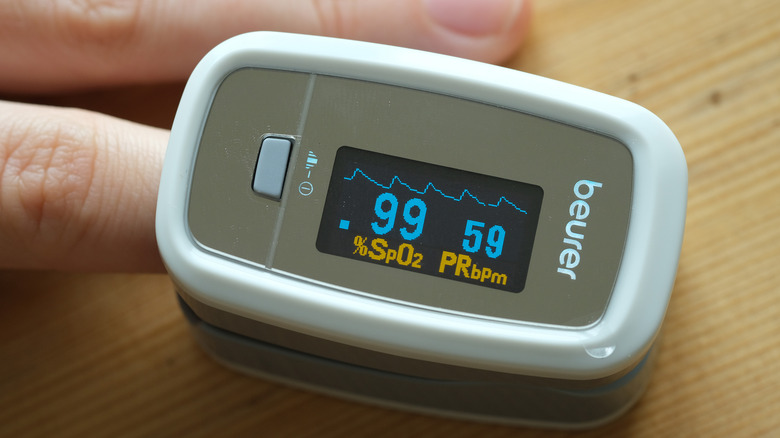What Is A Normal Blood Oxygen Level?
If you've experienced headaches, shortness of breath, chest pain, or confusion, you'd be correct in wondering if your blood oxygen levels might be low. These, along with a variety of other symptoms, some mild and others severe, could all indicate hypoxemia — a condition where blood oxygen levels are below normal (via Healthline). But what are normal blood oxygen levels, after all?
Healthy blood oxygen levels are vital for every aspect of health, from healthy tissues, to peaceful sleep, to mental clarity. But actually getting enough oxygen into your red blood cells so that it can be distributed throughout the body is a delicate and complicated process. Dr. Amit Uppal, director of critical care at Bellevue Hospital in New York City, explains, "We've got to get oxygen from the atmosphere into our lungs; we've got to get the oxygen from our lungs into our bloodstream, and then we've got to get the blood to our cells, and our cells have to take out that oxygen. So, all those things have to work right for things to go well" (via MSN).
Problems in any step along the process – lung problems, sleep apnea, and even high altitudes — can all lead to potentially dangerous low blood oxygen levels, according to Mayo Clinic.
Shortness of breath could indicate low blood oxygen levels
Blood oxygen levels can be measured in two ways — either through an arterial blood gas (ABG) test, or through a non-invasive pulse oximeter. For a generally healthy person, normal blood oxygen levels are between 80 and 100 millimeters of mercury (mm/Hg) on the ABG test, or 96-100% on the pulse oximeter. For someone with a heart or lung condition, though, the 'normal' range may be lower, according to Dr. Uppal (via MSN).
While doctors are not usually too concerned about blood oxygen levels getting too high, the opposite is not true. Dr. Uppal adds, "I think anything below 90 we definitely get very concerned. When it gets down into the 80 percent range or less than 80 percent range is when really bad things can happen."
Experts tell MSN that if you get a low blood oxygen reading at home on the pulse oximeter, or have symptoms — like shortness of breath, wheezing, or bluish skin — that could indicate low O2 levels, it's important to see your doctor. They can help determine if you would benefit from supplemental oxygen, or if there is an underlying condition that needs attention.


